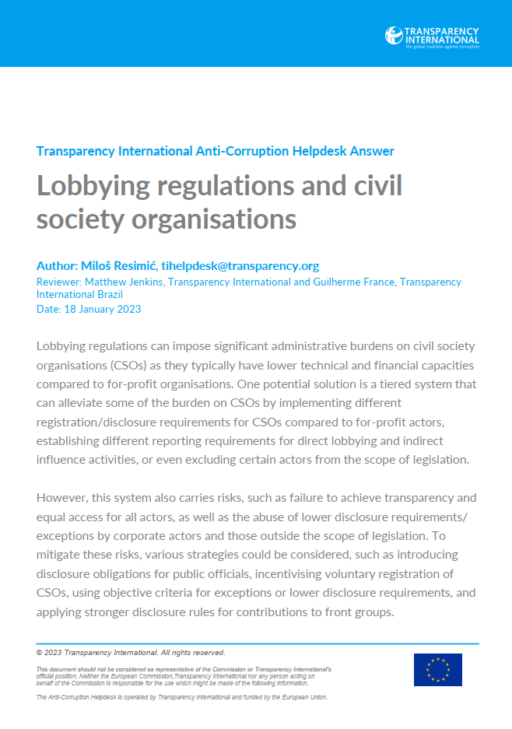
This Anti-Corruption Helpdesk brief was produced in response to a query from one of Transparency International’s national chapters. The Anti-Corruption Helpdesk is operated by Transparency International and funded by the European Union.
Query
How can lobbying regulation negatively affect civil society and not-for-profit organisations and what are the possible mitigating provisions to reduce or eliminate this impact?
Summary
Lobbying regulations can impose significant administrative burdens on civil society organisations (CSOs) as they typically have lower technical and financial capacities compared to for-profit organisations. One potential solution is a tiered system that can alleviate some of the burden on CSOs by implementing different registration/disclosure requirements for CSOs compared to for-profit actors, establishing different reporting requirements for direct lobbying and indirect influence activities, or even excluding certain actors from the scope of legislation.
However, this system also carries risks, such as failure to achieve transparency and equal access for all actors, as well as the abuse of lower disclosure requirements/ exceptions by corporate actors and those outside the scope of legislation. To mitigate these risks, various strategies could be considered, such as introducing disclosure obligations for public officials, incentivising voluntary registration of CSOs, using objective criteria for exceptions or lower disclosure requirements, and applying stronger disclosure rules for contributions to front groups.
Contents
- Introduction
- Limiting the negative impact of lobbying regulations on CSOs through a tiered system
- Types of tiered systems in lobbying regulation – country examples
- Risks of tiered systems
- Different disclosure requirements
- Negative effects of overly restrictive definitions of lobbyists/lobbying activities
- Towards minimum standards
- Mitigating risks
- Disclosure obligations for public officials
- Incentivising voluntary registration of CSOs
- A limited exception rule
- Stronger disclosure rules for contributions to front groups
- A public interest test
- Avoiding excessive reporting requirements for foreign funding
- Avoiding selective enforcement of administrative or criminal sanctions
- The impact of lobbying regulations beyond tiered systems
- References
Main points
- Tiered systems are one potential model to alleviate the negative effects of lobbying regulations on CSOs.
- Tiered systems can involve different registration/disclosure requirements for different types of actors or the complete exclusion of certain actors from the scope of lobbying legislation.
- Risks of tiered systems include difficulties in achieving transparency and equality for all actors, as well as abuse of lower disclosure requirements by corporate actors who can try to advance their interests through non-profit front groups.
- Some mitigation strategies may include disclosure requirements for public office holders, incentives for voluntary registration of CSOs, objective criteria for exceptions from disclosure rules, and stronger disclosure rules for contributions to front groups.
Authors
Miloš Resimić, [email protected]
Reviewers
Matthew Jenkins, Transparency International and Guilherme France, Transparency International Brazil
Date
31/01/2023
Tags
 Download PDF
Download PDF
